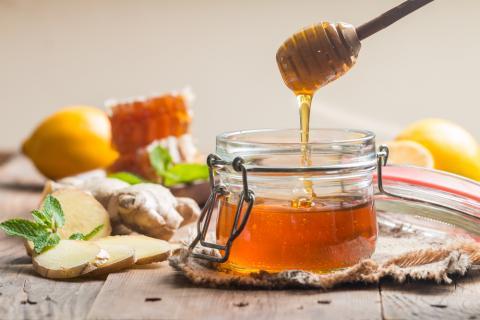
Honey is a wholesome, sticky, syrup that is naturally created by bees. It is a popular commodity, often overly-processed, packaged, and sold commercially in almost every grocery store. Many people buy processed honey, but is the pasteurized stuff really all that great? Read on to find out why you should try to avoid purchasing processed honey.
Reason 1: Processed honey often contains added ingredients.
Have you ever looked at the back of a processed honey bottle to see other ingredients such as corn syrup, sugar, or some other type of sweetener added? If so, then you probably aren’t purchasing honey. Although commercial honey sellers are required to label the bottles as containing other ingredients, they do not have to tell you how much of the ingredient is added to the honey. The FDA does make it mandatory that if there is more of another ingredient than honey, sellers must label the primary ingredient as the first ingredient. The seller does not have to do this if the amount of honey happens to be just a little above the amount of sugar, so basically you could be buying almost half a container of processed sugar instead of processed honey. In addition to this, it can be very difficult for the FDA to properly monitor whether large commercial honey sellers that process honey are actually using honey as their main ingredient rather than some other sweetener. Who knows? Consumers could be purchasing sugar syrup instead. It’s just a good idea to stay away from any honey containing added sweeteners.
Reason 2: Processed honey is normally ultra-filtered.
According to Food Safety News, the U.S. Food and Drug Administration (FDA),says any product that has been ultra-filtered and no longer contains pollen is no longer honey. The FDA defines honey as “a thick, sweet, syrupy substance that bees make as food from the nectar of flowers and store in honeycombs.” One of the only effective ways to tell if honey is legit is if it contains bits of bee pollen. Unfortunately for conscious consumers, most commercial honey factories use a high-technology procedure that usually involves heating, watering down, and forcing honey through really tiny filters in order to remove all of the bee pollen or other objects. Some commercial honey sellers may choose to remove the pollen because it is considered undesirable by consumers, while other commercial sellers do not want their honey to be traced back to its plant of origin. Food Safety News analyzed some common commercial honeys in a lab and found some contain no trace amounts of pollen. Although these products are not considered honey by the FDA’s definition, they are still labeled and sold as being honey. For more information on this topic, check out this great article on how to know if the honey you are buying is real. Here is a list of brands of honey that Food Safety News found to contain no trace amounts of pollen.
•American Choice Clover Honey
•Archer Farms Orange Blossom Honey
•Archer Farms Organic Classic Honey
•Busy Bee Organic Honey
•Busy Bee, Pure Clover Honey
•CVS Honey
•Fred Meyer Clover Honey
•Full Circle Pure Honey
•Giant Eagle Clover Honey
•GE Clover Honey
•Great Value, Clover Honey
•Haggen Honey, Natural & Pure
•HT Traders Tupelo Honey
•Kroger Pure Clover Honey
•Market Pantry Pure Honey
•Mel-o 100 % Pure Honey
•Natural Sue Bee Clover Honey
•Naturally Preferred Fireweed Honey
•Rite Aid Honey
•Safeway Clover Honey
•Silver Bow Pure Honey
•Stop and Shop Clove Honey
•Sue Bee Clover Honey
•Thrifty Bee Honey
•Valutime Honey
•Walgreen MEL-O honey
•Western Family Clover Honey
•Wegman Clover Honey
•Winnie the Pooh, Pure Clover
Reason 3: Processed honey is not wholesome.
Unpasteurized raw honey is considered to be wholesome, because of its medicinal, healing benefits, as well as its natural, complex flavor and color. Raw honey is a natural aid in such things as boosting the immune system, holistically helping with seasonal allergies, reducing inflammation, soothing burns, and healing wounds. On top of that, it also contains antioxidants and is antibacterial. Processed honey, on the other hand, typically only has the same light gold color with the same sugary flavor – and none of the good stuff. And let’s be honest, the filtered honey doesn’t even come near to tasting as good as raw honey. Unlike unprocessed honey, it doesn’t contain any pollen or propolis, which has the most benefits.
So where can you find unprocessed, raw honey? Most local bee farms, farmers markets, and local food co-ops sell honey that is raw or only lightly filtered. You can usually spot raw, unfiltered honey by its cloudiness, air bubbles, and thicker consistency. Heat is said to be the main separating line between raw unfiltered honey and processed honey. Another way to recognize raw honey is to look for small crystals forming at the top of the honey container, because the raw stuff tends to crystalize faster. The best way to make sure you are buying good honey is to buy from local beekeepers that you know.








